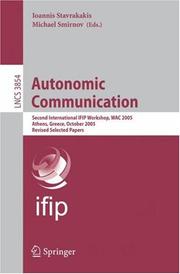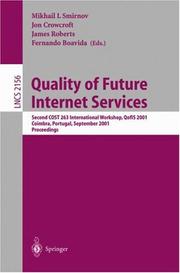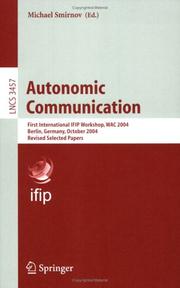| Listing 1 - 8 of 8 |
Sort by
|
Book
Abstract | Keywords | Export | Availability | Bookmark
 Loading...
Loading...Choose an application
- Reference Manager
- EndNote
- RefWorks (Direct export to RefWorks)
Book
ISBN: 1838809821 1838809813 Year: 2020 Publisher: London : IntechOpen,
Abstract | Keywords | Export | Availability | Bookmark
 Loading...
Loading...Choose an application
- Reference Manager
- EndNote
- RefWorks (Direct export to RefWorks)
Book
Year: 2005 Publisher: Berlin ; New York : Springer,
Abstract | Keywords | Export | Availability | Bookmark
 Loading...
Loading...Choose an application
- Reference Manager
- EndNote
- RefWorks (Direct export to RefWorks)
The ?rst IFIP Workshop on Autonomic Communication (WAC 2004) was held 18–19 October 2004 in Berlin, Germany. The workshop was organized by Fra- hofer FOKUS with the help of partners of the EU-funded Autonomic Com- nication Coordination Action — IST-6475 (ACCA), and under technical sp- sorship of IFIP WG6. 6 — Management of Networks and Distributed Systems. The purpose of this workshop was to discuss Autonomic Communication—a new communication paradigm to assist the design of the next-generation n- works. WAC 2004 was explicitly focused on the principles that help to achieve purposeful behavior on top of self-organization (self-management, self-healing, self-awareness, etc. ). The workshop intended to derive these common principles from submissions that study network element’s autonomic behavior exposed by innovative (cross-layer optimized, context-aware, and securely programmable) protocol stack (or its middleware emulations) in its interaction with numerous, often dynamic network groups and communities. The goals were to understand how autonomic behaviors are learned, in?uenced or changed, and how, in turn, these a?ect other elements, groups and the network. The highly interactive and exploratory nature of WAC 2004 de?ned its format — six main sessions grouped in three blocks, each block followed by a panel with all speakers of the previous block as panellists and session chairs as panel moderators. The?rstpanelaimedtohighlightthemainprinciplesguidingresearchinal- rithms,protocolsandmiddleware;thesecondpanelinvestigatedgrandchallenges of network and service composition; the third panel had to answer the question “HowDoestheAutonomicNetworkInteractwiththeKnowledgePlane?”. Panel reports were compiled by panel moderators and conclude this volume.
Computer communication systems. --- Application software. --- Information storage and retrieval. --- Electrical engineering. --- Computer Communication Networks. --- Information Systems Applications (incl. Internet). --- Information Storage and Retrieval. --- Communications Engineering, Networks. --- Autonomic communication --- Autonomic computing --- Database management --- Computer networks --- Management
Book
Year: 2005 Publisher: Berlin ; New York : Springer,
Abstract | Keywords | Export | Availability | Bookmark
 Loading...
Loading...Choose an application
- Reference Manager
- EndNote
- RefWorks (Direct export to RefWorks)
The ?rst IFIP Workshop on Autonomic Communication (WAC 2004) was held 18–19 October 2004 in Berlin, Germany. The workshop was organized by Fra- hofer FOKUS with the help of partners of the EU-funded Autonomic Com- nication Coordination Action — IST-6475 (ACCA), and under technical sp- sorship of IFIP WG6. 6 — Management of Networks and Distributed Systems. The purpose of this workshop was to discuss Autonomic Communication—a new communication paradigm to assist the design of the next-generation n- works. WAC 2004 was explicitly focused on the principles that help to achieve purposeful behavior on top of self-organization (self-management, self-healing, self-awareness, etc. ). The workshop intended to derive these common principles from submissions that study network element’s autonomic behavior exposed by innovative (cross-layer optimized, context-aware, and securely programmable) protocol stack (or its middleware emulations) in its interaction with numerous, often dynamic network groups and communities. The goals were to understand how autonomic behaviors are learned, in?uenced or changed, and how, in turn, these a?ect other elements, groups and the network. The highly interactive and exploratory nature of WAC 2004 de?ned its format — six main sessions grouped in three blocks, each block followed by a panel with all speakers of the previous block as panellists and session chairs as panel moderators. The?rstpanelaimedtohighlightthemainprinciplesguidingresearchinal- rithms,protocolsandmiddleware;thesecondpanelinvestigatedgrandchallenges of network and service composition; the third panel had to answer the question “HowDoestheAutonomicNetworkInteractwiththeKnowledgePlane?”. Panel reports were compiled by panel moderators and conclude this volume.
Computer communication systems. --- Application software. --- Information storage and retrieval. --- Electrical engineering. --- Computer Communication Networks. --- Information Systems Applications (incl. Internet). --- Information Storage and Retrieval. --- Communications Engineering, Networks. --- Autonomic communication --- Autonomic computing --- Database management --- Computer networks --- Management
Book
Year: 2005 Publisher: Berlin ; New York : Springer,
Abstract | Keywords | Export | Availability | Bookmark
 Loading...
Loading...Choose an application
- Reference Manager
- EndNote
- RefWorks (Direct export to RefWorks)
The ?rst IFIP Workshop on Autonomic Communication (WAC 2004) was held 18–19 October 2004 in Berlin, Germany. The workshop was organized by Fra- hofer FOKUS with the help of partners of the EU-funded Autonomic Com- nication Coordination Action — IST-6475 (ACCA), and under technical sp- sorship of IFIP WG6. 6 — Management of Networks and Distributed Systems. The purpose of this workshop was to discuss Autonomic Communication—a new communication paradigm to assist the design of the next-generation n- works. WAC 2004 was explicitly focused on the principles that help to achieve purposeful behavior on top of self-organization (self-management, self-healing, self-awareness, etc. ). The workshop intended to derive these common principles from submissions that study network element’s autonomic behavior exposed by innovative (cross-layer optimized, context-aware, and securely programmable) protocol stack (or its middleware emulations) in its interaction with numerous, often dynamic network groups and communities. The goals were to understand how autonomic behaviors are learned, in?uenced or changed, and how, in turn, these a?ect other elements, groups and the network. The highly interactive and exploratory nature of WAC 2004 de?ned its format — six main sessions grouped in three blocks, each block followed by a panel with all speakers of the previous block as panellists and session chairs as panel moderators. The?rstpanelaimedtohighlightthemainprinciplesguidingresearchinal- rithms,protocolsandmiddleware;thesecondpanelinvestigatedgrandchallenges of network and service composition; the third panel had to answer the question “HowDoestheAutonomicNetworkInteractwiththeKnowledgePlane?”. Panel reports were compiled by panel moderators and conclude this volume.
Computer communication systems. --- Application software. --- Information storage and retrieval. --- Electrical engineering. --- Computer Communication Networks. --- Information Systems Applications (incl. Internet). --- Information Storage and Retrieval. --- Communications Engineering, Networks. --- Autonomic communication --- Autonomic computing --- Database management --- Computer networks --- Management

ISBN: 9783540329923 3540329927 3540329935 Year: 2006 Publisher: Berlin ; New York : Springer,
Abstract | Keywords | Export | Availability | Bookmark
 Loading...
Loading...Choose an application
- Reference Manager
- EndNote
- RefWorks (Direct export to RefWorks)
The Second IFIP Workshop on Autonomic Communication (WAC 2005) took place on October 2–5, 2005, in Athens, Greece. The previous (and first) edition of WAC took place in Berlin in 2004 and its next (and third) edition in Paris in 2006. The workshop was organized by the National and Kapodistrian University of Athens and was supported by the EU-funded IST-FET Autonomic Communication Coordination Action (ACCA – IST-6475). Additional support was provided by the EU-funded IST Network of Excellence E-NEXT (IST-506869). Finally, IFIP TC6 provided scientific sponsorship through Working Groups IFIP WG6. 6 (Management of Networks and Distributed Systems) and IFIP WG6. 3 (Performance of Communication Systems). The workshop was organized at a time when the – yet to be well defined – field of autonomic communication (AC) is attracting the interest of both the scientific community and the research funding organizations. The latter is manifested, on one hand, by the numerous recent relevant research exploratory forums, workshop panels, preliminary forward-looking position papers, research outlooks and frameworks and, on the other hand, by the commitment of the FET program of the European Commission in Europe to funding long-term research in this area for the next four years. Consequently, the second edition of WAC was highly exploratory and included a nice mix of technical work addressing some already identified problems and well-articulated ideas on the direction this field should take and the fundamental problems whose solution would enable autonomicity.
Autonomic computing --- Informatique autonome --- Congresses. --- Congrès --- Database management --- Computer networks --- Computer Science --- Telecommunications --- Engineering & Applied Sciences --- Electrical & Computer Engineering --- Management --- Information Technology --- Computer Science (Hardware & Networks) --- Computer science. --- Computer communication systems. --- Information storage and retrieval. --- Electrical engineering. --- Computer Science. --- Computer Communication Networks. --- Information Systems Applications (incl. Internet). --- Information Storage and Retrieval. --- Communications Engineering, Networks. --- Electric engineering --- Engineering --- Communication systems, Computer --- Computer communication systems --- Data networks, Computer --- ECNs (Electronic communication networks) --- Electronic communication networks --- Networks, Computer --- Teleprocessing networks --- Data transmission systems --- Digital communications --- Electronic systems --- Information networks --- Telecommunication --- Cyberinfrastructure --- Electronic data processing --- Network computers --- Informatics --- Science --- Distributed processing --- Information storage and retrieva. --- Telecommunication. --- Electric communication --- Mass communication --- Telecom --- Telecommunication industry --- Communication --- Information theory --- Telecommuting --- Information storage and retrieval systems. --- Automatic data storage --- Automatic information retrieval --- Automation in documentation --- Computer-based information systems --- Data processing systems --- Data storage and retrieval systems --- Discovery systems, Information --- Information discovery systems --- Information processing systems --- Information retrieval systems --- Machine data storage and retrieval --- Mechanized information storage and retrieval systems --- Computer systems --- Electronic information resources --- Data libraries --- Digital libraries --- Information organization --- Information retrieval --- Application software. --- Application computer programs --- Application computer software --- Applications software --- Apps (Computer software) --- Computer software

ISBN: 3540426027 9783540426028 3540454128 Year: 2001 Volume: 2156 Publisher: Berlin, Heidelberg : Springer Berlin Heidelberg : Imprint: Springer,
Abstract | Keywords | Export | Availability | Bookmark
 Loading...
Loading...Choose an application
- Reference Manager
- EndNote
- RefWorks (Direct export to RefWorks)
The 2001 International Workshop on Quality of future Internet Services (QofIS 2001) held in Coimbra, Portugal, organized by COST Action 263, is the second of what we expect will become a series of successful QofIS workshops. The previous workshop was held in Berlin in the year 2000. The areas of interest of QofIS cover the design, implementation and provision of Quality of Service, spanning key issues of current and emerging communication systems such as packet-level issues, flow-level issues, network-level issues, architectural issues, and applications. The emphasis of the QofIS2001 w orkshop is on horizontal (end-to-end) as well as vertical (top-down) provision of quality of services, covering all components of end systems and networks, with the aim of identifying solutions enabling feasible and coherent QoS provision. The QofIS2001 cal l for papers attracted 87 submissions from 23 Asian, Australian, European, North American, and South American countries. These were subject to thorough review work by the Programme Committee members and additional reviewers who carried out their work using a specially built conference system, WebChairing, developed in Coimbra by Flor de Utopia, that allowed full control of the submission and reviewing processes. Based on the comments and recommendations of the reviews, the final programme was defined in a Programme th Committee meeting held at the University of Karlsruhe on June 5 , 2001.
Internet --- Computer networks --- Reliability --- Quality control --- Telecommunications --- Electrical & Computer Engineering --- Engineering & Applied Sciences --- Popular works. --- Computer communication systems. --- Information storage and retrieval. --- Multimedia information systems. --- Computer industry. --- Computer science. --- Popular Science. --- Popular Computer Science. --- The Computer Industry. --- Computer Communication Networks. --- Information Systems Applications (incl. Internet). --- Information Storage and Retrieval. --- Multimedia Information Systems. --- Information storage and retrieva. --- Multimedia systems. --- Computer-based multimedia information systems --- Multimedia computing --- Multimedia information systems --- Multimedia knowledge systems --- Information storage and retrieval systems --- Electronic industries --- Information storage and retrieval systems. --- Automatic data storage --- Automatic information retrieval --- Automation in documentation --- Computer-based information systems --- Data processing systems --- Data storage and retrieval systems --- Discovery systems, Information --- Information discovery systems --- Information processing systems --- Information retrieval systems --- Machine data storage and retrieval --- Mechanized information storage and retrieval systems --- Computer systems --- Electronic information resources --- Data libraries --- Digital libraries --- Information organization --- Information retrieval --- Application software. --- Application computer programs --- Application computer software --- Applications software --- Apps (Computer software) --- Computer software --- Communication systems, Computer --- Computer communication systems --- Data networks, Computer --- ECNs (Electronic communication networks) --- Electronic communication networks --- Networks, Computer --- Teleprocessing networks --- Data transmission systems --- Digital communications --- Electronic systems --- Information networks --- Telecommunication --- Cyberinfrastructure --- Electronic data processing --- Network computers --- Informatics --- Science --- Distributed processing --- Internet - Congresses --- Computer networks - Reliability - Congresses --- Computer networks - Quality control - Congresses

ISSN: 03029743 ISBN: 3540274170 9783540274179 3540320091 Year: 2004 Volume: 3457 Publisher: Berlin: Springer,
Abstract | Keywords | Export | Availability | Bookmark
 Loading...
Loading...Choose an application
- Reference Manager
- EndNote
- RefWorks (Direct export to RefWorks)
The ?rst IFIP Workshop on Autonomic Communication (WAC 2004) was held 18–19 October 2004 in Berlin, Germany. The workshop was organized by Fra- hofer FOKUS with the help of partners of the EU-funded Autonomic Com- nication Coordination Action — IST-6475 (ACCA), and under technical sp- sorship of IFIP WG6. 6 — Management of Networks and Distributed Systems. The purpose of this workshop was to discuss Autonomic Communication—a new communication paradigm to assist the design of the next-generation n- works. WAC 2004 was explicitly focused on the principles that help to achieve purposeful behavior on top of self-organization (self-management, self-healing, self-awareness, etc. ). The workshop intended to derive these common principles from submissions that study network element’s autonomic behavior exposed by innovative (cross-layer optimized, context-aware, and securely programmable) protocol stack (or its middleware emulations) in its interaction with numerous, often dynamic network groups and communities. The goals were to understand how autonomic behaviors are learned, in?uenced or changed, and how, in turn, these a?ect other elements, groups and the network. The highly interactive and exploratory nature of WAC 2004 de?ned its format — six main sessions grouped in three blocks, each block followed by a panel with all speakers of the previous block as panellists and session chairs as panel moderators. The?rstpanelaimedtohighlightthemainprinciplesguidingresearchinal- rithms,protocolsandmiddleware;thesecondpanelinvestigatedgrandchallenges of network and service composition; the third panel had to answer the question “HowDoestheAutonomicNetworkInteractwiththeKnowledgePlane?”. Panel reports were compiled by panel moderators and conclude this volume.
Computer communication systems. --- Application software. --- Information storage and retrieval. --- Electrical engineering. --- Computer Communication Networks. --- Information Systems Applications (incl. Internet). --- Information Storage and Retrieval. --- Communications Engineering, Networks. --- Electric engineering --- Engineering --- Application computer programs --- Application computer software --- Applications software --- Apps (Computer software) --- Computer software --- Communication systems, Computer --- Computer communication systems --- Data networks, Computer --- ECNs (Electronic communication networks) --- Electronic communication networks --- Networks, Computer --- Teleprocessing networks --- Data transmission systems --- Digital communications --- Electronic systems --- Information networks --- Telecommunication --- Cyberinfrastructure --- Electronic data processing --- Network computers --- Distributed processing --- Autonomic communication --- Autonomic computing --- Database management --- Computer networks
| Listing 1 - 8 of 8 |
Sort by
|

 Search
Search Feedback
Feedback About UniCat
About UniCat  Help
Help News
News